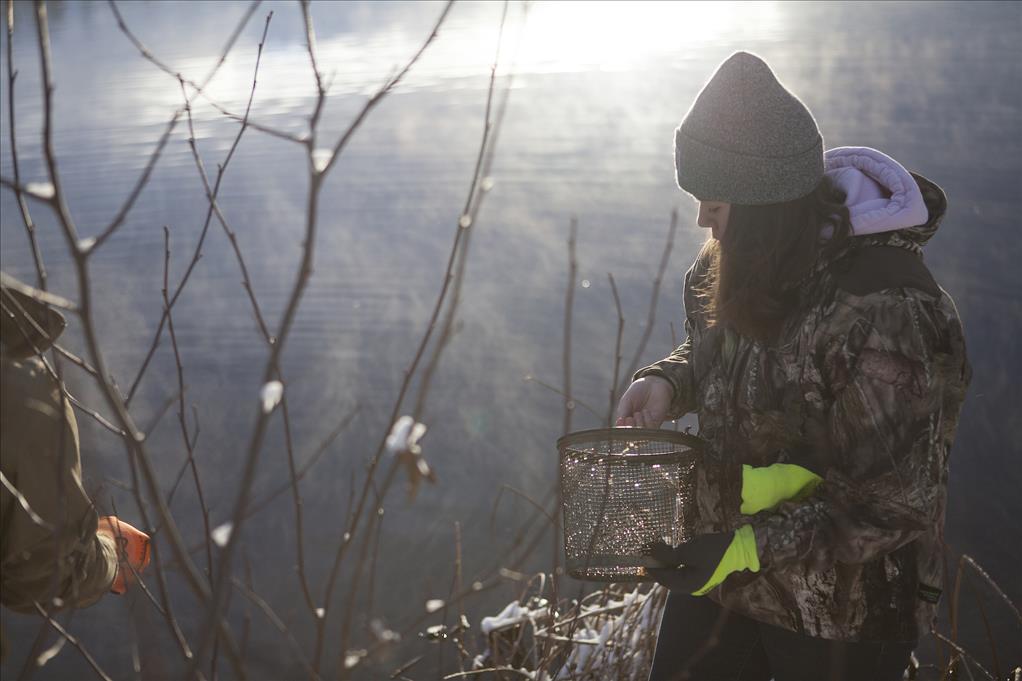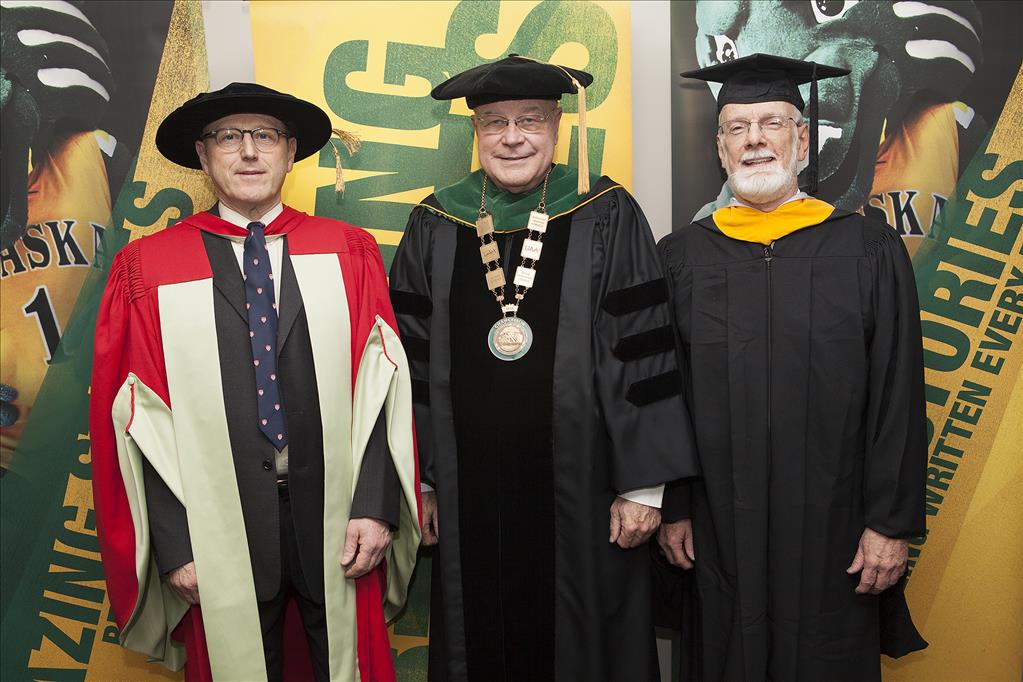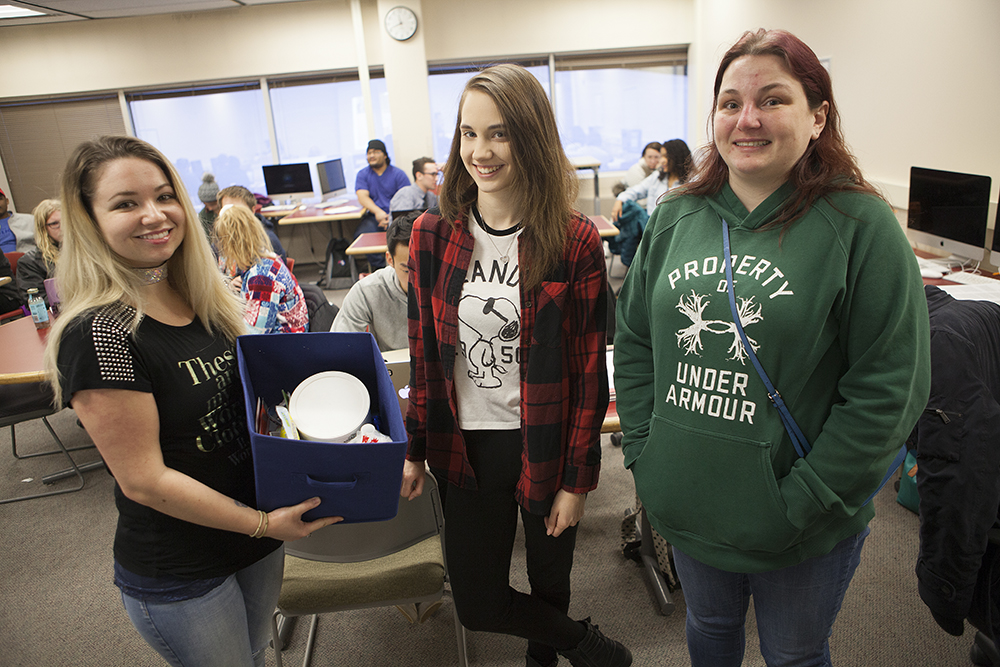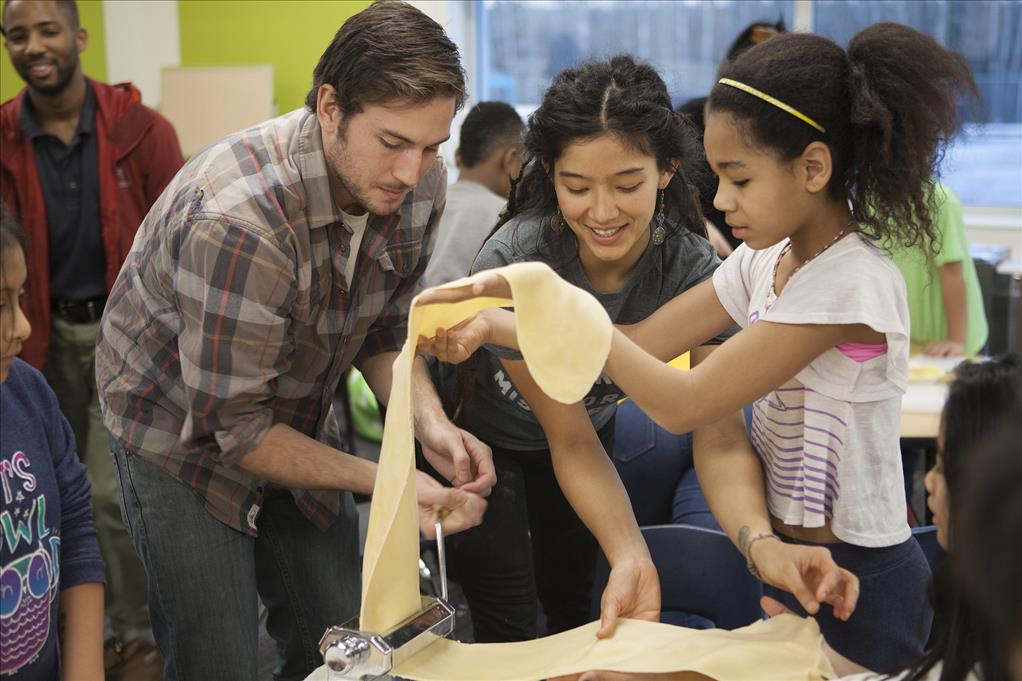‘I started appreciating my culture...learned to love it'
by Tracy Kalytiak |
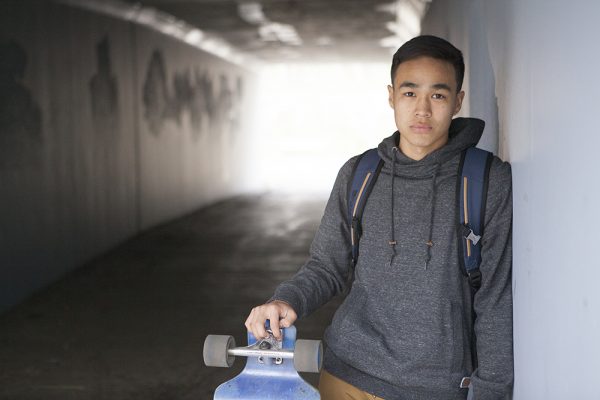
Byron Nicholai, a UAA elementary education student, has a flourishing Facebook page, "I Sing, You Dance", which features his Yup'ik language singing, as well as traditional Yup'ik dancing and drumming. (Photo by Philip Hall / University of Alaska Anchorage)
Back in 2013, a teenage boy in Toksook Bay needed to charge his iPhone, so he plugged it in in the living room.
"I didn't want to leave without it being fully charged," Byron Nicholai remembered. "I was singing to, you know, make the time go by faster. I recorded on my phone because I thought it would be cool to sing and then use an app to make my voice sound like a chipmunk. Then I posted that video."
Byron made more videos of himself singing in his own voice, in his own language, often while drumming-and posted them to his Facebook page, I Sing, You Dance. People in and then outside his community liked what they heard and shared his songs. By Oct. 5, 2014, 1,000 people were following his page. One month later, there were 3,000.
Now, Byron is an 18-year-old UAA student majoring in elementary education and Alaska Native studies. As of Oct. 19, he had 30,174 Facebook followers, and, last month, performed for President Barack Obama in Washington, D.C.
"If a village kid could go from singing to phones to singing for presidents, that really does show that anything is possible," Byron said. "I'm always trying to send out that message."
Going places
Byron grew up in Toksook Bay, a community of 617 people situated on Nelson Island. Until enrolling at UAA, he lived there with his mother, who works as a school secretary. He has three younger brothers and two older sisters; his father resides in Atmautluak.
"I listen to my mom, I owe everything to my mom, I'm going to school because of my mom," Byron said, explaining why he decided to attend UAA.
As a young child, Byron learned traditional Yup'ik dances. His cousin, Moses Charles, taught him to sing.
"I would dance with the Toksook Bay Traditional Dancers," he said. "They would travel to other villages and I would go with my mom. We moved away [to Bethel, in first grade]. I came back to Toksook in fifth grade. My cousin was the lead drummer for the Nelson Island Dancers and he told me to join, so I did. I thought I was joining as a dancer but I joined as a drummer."
His first performance, in fifth grade, happened just before he needed to fly to Dillingham for a cross country meet.
"The plane was already at the airport," he said. "I was the last one to sing. You know what's weird? I made that song when I was 12. It's a song about my songs bringing me to places and now look what's happening. My songs really are bringing me to places. That's the first song I ever, ever made in my entire life."
Impromptu inspirations
Byron's songs have often been spur-of-the-moment creations, songs about basketball or a walk on the beach with friends-even a modern-traditional splice of Yup'ik and rap, Tuallu, which emerged from a collaboration with Mike McIntyre.
His thoughts about family and culture inspired others. Another video showed him dancing on a hill, with Toksook Bay as his backdrop.
"After I started posting those videos, a lot of people were saying it's helping their kids or their friends or their students learn Yup'ik words through the songs," he said. "People would be like, my daughter listens to your songs; she's becoming a better Yup'ik speaker than I am. Knowing I'm helping someone just by doing what I love, it's like a really nice reward. It's like a hobby, but a really powerful one."
One of his songs, I am Yup'ik, resonated-earning thousands of Facebook and YouTube shares and more than 100,000 views.
In one of his videos, Byron sings the song with others on the Toksook Bay Islanders basketball team-his team made it to the state tournament three years in a row. (He has also competed in the Native Youth Olympics, in the wrist carry and Indian stick pull) And, his album, I am Yup'ik, is available on iTunes and Amazon.
Byron's renown connected him with producers of a short ESPN film about basketball and Yup'ik culture-he starred in I am Yup'ik, which earned a spot on the lineup for the 2016 Sundance Film Festival, which highlights the work of independent filmmakers.
People in Yup'ik and other Alaska Native communities responded-"Quyana cakneq Byron! You are my role model even though I don't know you. You're keeping our culture alive," said Diana Michelle of Emmonak, in a Facebook comment on his page. "You have so many young kids looking up to you already and listening to your songs," Uryu Charlene wrote. "So proud of you," wrote Auhluq Afcan. "Thank you for making your parents and ancestors proud and thankful for your mission." "Put the natives on the map! Represent!" wrote Scott Agathluk of Bethel.
Admiration for his singing, dancing and efforts to highlight Yup'ik and other Alaska Native cultures also comes from people outside Alaska and the U.S.
"You're a world changer who is deeply rooted in your culture," wrote Kylene Hong of Madison, Wis., "and you have an amazing gift to share. Thank you!"
'I made it become me'
Byron travels frequently, both in and out of Alaska. Yute Air has sponsored his flights throughout the Yukon-Kuskokwim Delta, taking him to the Cama-i Dance Festival in Bethel and to villages where he speaks to kids as well as singing, drumming and dancing.
He's also performed at the Alaska Federation of Natives' annual convention and ANSEP students and the Alaska Native Heritage Center in Anchorage, as well as in Seattle, Arizona and, of course, Washington, D.C., where he performed last year for Secretary of State John Kerry and Arctic nation leaders before his concert this year for Obama at the eighth-annual White House Tribal Nations Conference.
"There were some points in my life I was confused with myself," he said. "But then as I got older, I realized being Yupik was unique and how being unique's very important. You're not the same from everyone else, you're different. I started appreciating my culture, I learned to love it, I made it become me and look where it's taken me."
Written by Tracy Kalytiak, University of Alaska Anchorage
 "‘I started appreciating my culture...learned to love it'" is licensed under a Creative Commons Attribution-NonCommercial 4.0 International License.
"‘I started appreciating my culture...learned to love it'" is licensed under a Creative Commons Attribution-NonCommercial 4.0 International License.










